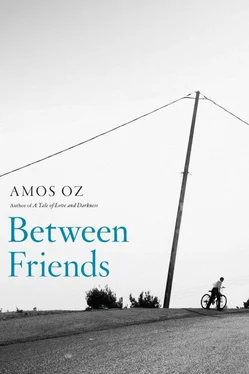“Go and talk to Yoav. I don’t think anything will come of it, I’ve already spoken to him, but you should try anyway.”
“I won’t talk to Yoav, Mother. There’s no point. They’ll never let me go.” After a brief silence, he added, “I’d like to travel to Italy. Or maybe not to Italy in particular. Just somewhere. But mechanical engineering is not for me.”
“But you want to go to college, don’t you? And Arthur is offering to pay for it.”
“What I want, more or less, is not to live here for a few months. Maybe a year. Maybe two. Then we’ll see.”
“You want to leave the kibbutz?”
“I don’t know. I didn’t say leave. I said travel. We’ll see. I only know that I need to go away, at least for a while.”
“Do you even remember Arthur?”
“No. Almost not at all. I remember that he liked to tell jokes all the time. I remember pipe smoke. And that he once brought me skates as a gift and the Education Committee decided that they would belong to all the kids in my class. And I know, too, that the whole kibbutz has been angry with him since he refused to come back here and decided to stay in Italy.”
Henia said, “Your brother Gideon finished the army, worked quietly for three years in the fodder fields, got married, had a child and waited his turn, and then the kibbutz sent him to study agriculture at the Ruppin Institute. But you won’t wait. You can leave now and you will leave now. What do you care what the general meeting decides? You’ll come back here an engineer and they can all eat their hearts out. Or maybe you won’t come back.”
“I can’t take it here anymore, Mother. Arthur invited me and I want to go. But only if the general meeting agrees. And no mechanical engineering.”
Henia said, “They won’t agree. The air is full of spite.”
The sour smell of rotten, fermenting orange peel and the stench of cow dung coming from the direction of the barn filled the room. A malicious mosquito buzzed piercingly next to Henia’s ear. She slapped herself hard in a vain attempt to squash it. Finally she said, “You don’t know what you want yourself. Go to the office tomorrow and talk to Yoav Carni. Yoav is a sympathetic person. Maybe together you’ll find some kind of compromise.”
Yotam didn’t want to talk to the secretary. In fact, he didn’t want to talk to anyone. Not his mother either. What he wanted was to go out for a walk. Several times, in the early evening, he’d wandered alone among the ruins of Deir Ajloun for almost an hour. He went into the destroyed mosque and the dynamited sheikh’s house but found nothing there because he didn’t know what he was looking for, so, shoulders hunched, he walked back to the kibbutz. He had a vague desire now to return and examine the ruins, as if something were buried there under the avalanche of rocks or in the darkness of the blocked well, a simple answer. But what the question was, he didn’t know.
Some people on our kibbutz thought that Yotam Kalisch was hopelessly in love with Nina Sirota, who was five or six years older than he was and had separated from her husband several months earlier. When she left her apartment and moved into a room the Apartment Committee allocated to her at the far end of Housing Area 3, Yotam went there one day after work in the orchards and, without saying a word, turned the soil in her new garden with a pitchfork. More than once, we saw him linger at the door to the dining hall till she came out, then follow her along the kibbutz paths until his courage failed him and he turned onto a side path and walked away. He almost never dared to talk to her but sometimes went to the carpentry shop in the evening and made small wooden toys for her children. In his huge hands, the toys looked like miniatures. When a notice was hung on the bulletin board at the dining-hall entrance calling for members to sign up for special work on Saturdays, we noticed that Yotam waited for Nina to sign up, then put his name down for work on the same Saturday she had chosen. But when they were actually working together, he almost never spoke to her. Only once did he summon the courage to ask her among the rows of vines, “Is the heat bothering you, Nina?” And she replied with a smile, “No, everything’s fine, thank you.”
She was always pleased to see him, and when they met on the path, she asked how he was, how his mother was, and what was new in the orchards. Actually, it wasn’t just Yotam she was pleased to see. She was cordial to everyone on the kibbutz, even the children. There was always an air of pleasant warmth about her when, with a smile, she’d say the most ordinary words to you, such as good evening, how are you, what’s new?
Roni Shindlin said, “Here we go again. Another broken heart. The caterpillar has fallen in love with the butterfly.”
Nina was appreciated for her confident opinions and her willingness to go up against the prevailing view. She had introduced a subversive element of restlessness at the general meetings, and it seemed that the secretary, Yoav Carni, supported her on one issue or another, to the great chagrin of the conservatives. Working on her own in the apiary, she had continued to make it a profitable branch of Kibbutz Yekhat. At the kibbutz meetings, she often fought for her view that the men had to take on a larger part of the service work in the kitchen, laundry, and children’s house so that the women would be free to go out and work in the fields. When she left her husband, Avner Sirota, some people said, “That girl only knows how to break things.” Others said, “That girl has decided to be head of the opposition on Kibbutz Yekhat.” And still others said, “Who does she think she is?”
Since Nina Sirota had sought out Yoav Carni, the kibbutz secretary, the night he was on guard duty, their relationship had become one of cautious fondness and heightened awareness. Sometimes he asked her advice about matters on the kibbutz agenda. He didn’t always agree with her opinion, but he always found her to be original, lucid, and trustworthy. Early one Thursday evening he found her sitting on a bench in the garden watching her children play in the sandpit. He sat down on her left and they spoke a bit about the heat and the problem with the swimming pool. Then, as if reading his mind, Nina said that at the meeting on Saturday night, it might be a good idea to try and find a compromise on the question of Yotam’s trip to Italy. After all, when the time came, the kibbutz would send him to college anyway. And now that his uncle had invited him, maybe they should let him go before it was his turn, but only if he learned a profession the kibbutz chose together with him, instead of the irrelevant one his uncle had chosen. Yoav asked, “For example?”
Nina replied, “For example, veterinary medicine. We have cows, sheep, and chickens here, not to mention our pets, and a vet comes from the city at least once a week. Yotam can study veterinary medicine in Italy. When he gets his degree, he can come back to Yekhat and be our vet and work in other villages in the area too. Why not?” Then she added, “I think he’d make a very good vet.”
Yoav thought about it for a moment, shrugged, and said that they might be able to sell the idea, though it wouldn’t be easy, and only if Yotam agreed to postpone his trip for two years until it was his turn to go to college.
Nina said, “One year?”
Yoav shook his head, opened his mouth, closed it, hesitated, and finally said, “We could try. I’ll talk to him. The problem is that his mother is pressuring the whole kibbutz, making everyone angry and turning public opinion against him. And the second problem is that all the old-timers are still furious with Arthur because they think he deserted the kibbutz when he was sent to Italy. Yotam is a little in love with you, isn’t he? Maybe you should talk to him?”
Читать дальше












